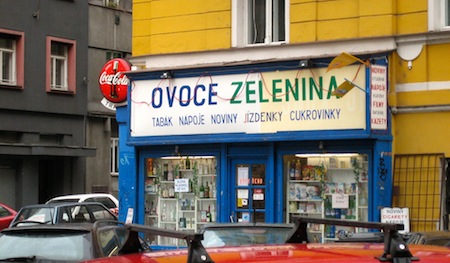Former Czechoslovakia is very much in the news this month, with January 1 marking the 20-year anniversary of the split into the Czech Republic and Slovakia, and with the upcoming Czech presidential election.![]()
![]()
But one of the more interesting questions in 2012 and in 2013 has been the variance between the Czech economy and the Slovak economy.
Given that the Czech Republic, which still uses the koruna as its currency, retains full monetary policy independence, and that Slovakia has been a member of the eurozone since 2009, you might expect the Czech economy to be in a better position, given that Greece, Spain, Italy and other countries in Europe have suffered greatly from being shackled through their membership in the eurozone. That seems especially true considering that the eurozone’s one-size-fits-all monetary policy was too loose for the eurozone periphery before the 2008 financial crisis and now seems, despite European Central Bank president Mario Draghi’s best efforts, too tight today.
Yet the result is exactly the opposition — the Czech economy, growing at a relatively weak 1.7% in 2011, fell into a shallow contraction in 2013, while the Slovak economy continues to grow — 3.3% GDP growth in 2011 and around 2.5% growth in 2012.
So what explains the difference? I see three dynamics in particular:
First, given that Slovakia was always less developed than what’s now the Czech Republic, there’s simply more low-hanging fruit. The Czech economy (in PPP terms) is $286 billion, while Slovakia’s economy is just $132 billion. On a per capita basis, Czechs, with a GDP per capita of just over $27,000, are still better off than Slovaks, with a GDP per capital of just over $24,000. But that’s not such an incredible gap, and so I’m not sure that necessarily explains the disparity in GDP growth.
Secondly, and this is probably related to the first point, the relatively recent entry into the eurozone has likely boosted the Slovak economy in the short term, reducing the transactions costs of trade with the rest of western Europe, upon which both Slovakia and the Czech Republic depend for much of their export growth. The Slovakian automobile industry, in particular, continues to fuel the country’s export strength.
Finally, we can look to economy policymaking — while the center-right Czech government has been focused on budget austerity, the social democratic Slovak government has been much more liberal with respect to using government as a tool to boost growth, despite the fact that both countries carry a public debt of a bit over 40% of their respective GDPs. Petr Nečas, the Czech prime minister since 2010, and the leader of the Občanská demokratická strana (ODS, Civic Democratic Party) that dominates the center-right governing coalition, has faced massive protests in the face of an austerity program that’s features not only tax increases, but painful spending cuts and reductions in government services.
Conversely, although Slovakian prime minister Robert Fico, the leader of the Smer – sociálna demokracia (Smer-SD, Direction — Social Democracy), has pursued tax increases since taking power in March 2012 on a wave of discontent over austerity. A previously flat tax of 19% will become a little more progressive, with an upper limit of 25% for the wealthiest taxpayers. Meanwhile, his government has attempted to shield the poorest Slovakians from additional spending cuts (and conceivably, they are the economic actors most likely to benefit from — and spend — each marginal euro of support from the government, thereby boosting aggregate demand). Fico has furthermore boosted budgetary funds for transport infrastructure and for equalizing educational opportunities throughout all regions of Slovakia.
It’s also worth keeping in mind that unemployment remains much higher in Slovakia — around 14%, nearly doubling the rate of between 7% and 8% in the Czech Republic, and it’s even worse among the poorer eastern parts of the country and among the disadvantaged Roma minority group.
GDP growth is not the only factor that determines the economic health of a country, and the Slovak government has not been successful in eliminating what appears to be a longstanding structural unemployment problem — at its lowest just before the 2008 financial crisis, the Slovak rate was 8.8%.
Photo credit to Kevin Lees — photo taken in Prague in December 2005.

